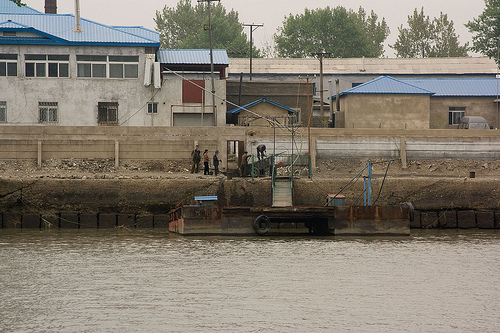What lies 25 miles north of Seoul is something of a mystery. Since the 1950s, the region has fallen out of favor, bringing otherwise-electric conversation to a screeching, brownout halt. Few people, it seems, know exactly where North Korea is, though they know it belongs somewhere near the top-right corner of the map—so far north Sarah Palin could probably see it from her house.
It’s easier, of course, to imagine the country as an army of Team America bobble-head dolls: to call it, as the late Christopher Hitchens did in a 2001 Vanity Fair article, a “necrocracy.” After all, it is not particularly strange that a dead man should rule a country where so many live a half-step from starvation. What’s strange is that, in a time obsessed by undead vampires and zombies, the real thing gathers little attention.
Escape from Camp 14: One Man’s Remarkable Odyssey from North Korea to Freedom in the West (Viking, April 2) is one such story. Despite its vivid details, thriller-novel pacing, and foundation in personal memoir, the book, a product of several interviews between Washington Post writer Blaine Harden and North Korean refugee Shin Dong-hyuk, will likely fall beneath the radar of American audiences; regrettably, with greater ease than Shin struggled through a small opening in an high-voltage fence in 2005.
Though selected as one of Foreign Policy’s “21 books that will matter in 2012,” and a BBC Radio 4 “Book of the Week,” Escape From Camp 14 won’t likely pique the attention of Oprah’s Book Club. It is too blunt an instrument, particularly because it is so unbelievable, so tragic, and – like so many other stories of atrocity—concluded with a question mark.
North Korean labor camps… have lasted twice as long as the Soviet gulag and nearly twelve times longer than Nazi concentration camps.
Born into one of North Korea’s six “complete control districts” (i.e. labor camps), which have remained virtually unnoticed by the global community in spite of their visibility on Google Earth, Shin was stripped of his humanity from the start. Classified as “irredeemable” because of an uncle’s crime against the state (fleeing the country after the Korean War), Shin was regularly overworked, abused, and starved. In Camp 14, an isolated compound about 30 miles long and 15 miles wide, Shin was taught to believe that violence was normal and snitching a duty.
When Shin, at the age of 13, discovered that his mother and older brother were planning an escape attempt, he promptly told a prison guard. Within weeks, Shin’s mother and brother were brought in front of the crowded camp and shot. Though Shin sees this betrayal as the most trying burden his life, at the moment of execution Shin was angry. “He hated his mother and brother with the savage clarity of a wronged and wounded adolescent,” wrote Harden.
This is far from the first story of blatant disregard for humanity (Primo Levy’s Survival In Auschwitz, Jean Amery’s At the Mind’s Limits: Contemplations by a Survivor on Auschwitz and Its Realities, or Hannah Arendt’s Eichmann in Jerusalem), nor, unfortunately, is the physical record of Shin’s abuse unique (Tina Rosenberg’s Children of Cain or Peter Maass’s Love Thy Neighbor). What sets Escape From Camp 14 apart is that the preconditions for Shin’s imprisonment remain intact.
As Harden points out in the book’s introduction, North Korean labor camps—home to 150,000 to 200,000 prisoners according to the U.S. State Department—have lasted twice as long as the Soviet gulag and nearly twelve times longer than Nazi concentration camps. The longevity of the camps, however, provides little excuse for their existence.
“It is unthinkable,” wrote Aleksandr I. Solzhenitsyn in the The Gulag Archipelago, “to fail to distinguish between what constitutes an abominable atrocity that must be prosecuted and what constitutes that ‘past’ which ‘ought not to be stirred up.’”
With the death of Kim Jong-Il in December, these labor camps were passed on to the third generation of the Kim rule. The twenty-something Kim Jong-Un shows no sign of embracing the glasnost-style reforms that eventually led to the 1991 abolition of the Soviet gulag.
The refusal of the North Korean administration to evolve puts Shin in a curious position. As the only known defector born in a “no exit” camp, he faces the modern world with an albatross around his neck: one that no one else can see, and few are willing to acknowledge.
Blaine Harden, the book’s author, will be speaking at the Korea Society of New York on April 12. LiNK, a non-profit providing emergency relief to North Korean refugees, will be premiering their new documentary film, The People’s Crisis, at The New School on April 27.
